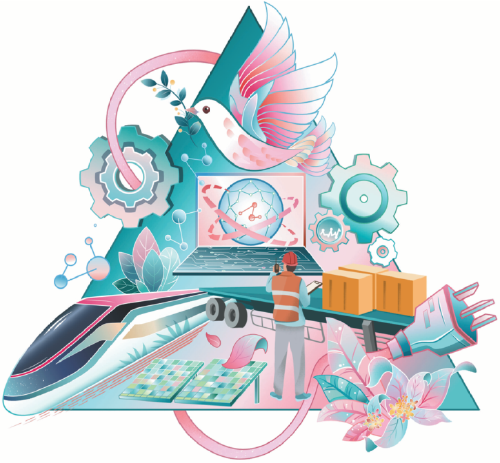Three for the better


China is significantly contributing to advancing sustainable development in the Global South through triangular cooperation
China has been actively involved in promoting triangular cooperation, which involves collaboration between traditional donors, emerging economies, and developing countries to achieve sustainable development.
These collaborative projects focus on areas such as poverty reduction, health, education and infrastructure development. By leveraging the strengths and resources of multiple partners, triangular cooperation projects can achieve more significant and sustainable outcomes. China's role in these initiatives demonstrates its commitment to working with international organizations and other stakeholders to address global development challenges.
First, China's involvement in poverty reduction is exemplified by the Africa-China Alliance for Poverty Alleviation and the China-Africa Poverty Reduction and Development Conference. These initiatives, organized in collaboration with the International Poverty Reduction Center in China and the United Nations Development Programme, facilitate the exchange of best practices in poverty alleviation and sustainable development. The 2022 conference highlighted China's contributions to food security, public-private partnerships, and trade and investment, reinforcing the relevance of these efforts in achieving the UN Sustainable Development Goals.
Second, China's contribution to triangular cooperation also includes providing financing and technical assistance for sustainable development projects. The China-UN Peace and Development Trust Fund, for example, supports a wide range of initiatives aimed at promoting peace, security and sustainable development in developing countries. Through this fund and other financial mechanisms, China has provided grants and concessional loans for infrastructure development, healthcare, education and environmental conservation projects.
Third, China's efforts in triangular cooperation extend to strengthening regional and global partnerships for sustainable development. Initiatives, such as the Belt and Road Initiative that promotes connectivity and cooperation across Asia, Africa, and Europe, foster economic growth and development. The BRI includes investments in infrastructure, trade and people-to-people exchanges, which contribute to regional integration and sustainable development. For instance, the construction of the Mombasa-Nairobi Standard Gauge Railway in Kenya, funded under the BRI, has significantly improved transportation efficiency and trade within the region. China's participation in multilateral platforms such as the G20 and BRICS also underscores its commitment to collaborative approaches to global challenges. By engaging in these platforms, China advocates for inclusive and sustainable development policies.
Fourth, China's advancements in digital and technological innovation have significant implications for triangular cooperation. By leveraging its expertise in these areas, China can support the digital transformation of developing countries, thereby enhancing their capacity for sustainable development. One of the key areas where China is making substantial contributions is in the development of digital infrastructure. For instance, the Digital Silk Road initiative aims to improve internet connectivity and digital infrastructure in developing countries. This initiative has been bolstered by partnerships with developed countries and organizations such as the European Union and the International Telecommunication Union, which provide additional funding, expertise and technological support. For example, in Cambodia, the establishment of a fiber optic network has significantly improved internet access and digital services through the combined efforts of Chinese technology and European Union funding and oversight.
Fifth, China's efforts also extend to the transfer of knowledge and capacity building in the digital sector. Programs that facilitate the sharing of expertise in areas such as e-commerce, fintech and smart cities are crucial for enabling developing countries to harness the benefits of digital technologies. Through the Forum on China-Africa Cooperation, China, in collaboration with the UNDP and the International Finance Corporation, has organized training programs and workshops to enhance digital skills and innovation capabilities in partner countries. In addition to infrastructure and capacity building, China is actively involved in promoting inclusive digital economies. Initiatives that focus on digital financial services, such as mobile banking and e-wallets, benefit from the joint efforts of Chinese expertise, funding from the World Bank, and technical assistance from the European Commission. For example, M-Pesa, a widely recognized mobile money service in Kenya, showcases how triangular cooperation can work effectively. While primarily a Kenyan initiative, its expansion has benefited from Chinese technological expertise. Huawei provided the technological backbone for M-Pesa, enhancing its scalability and security. The World Bank supported the financial inclusion aspects by funding complementary financial services that integrate with M-Pesa, promoting wider usage among the unbanked population. By supporting the development of inclusive digital economies, these partnerships contribute to poverty reduction and economic empowerment in developing countries.
While China's role in promoting triangular cooperation for sustainable development is noteworthy, it is not without challenges and criticism. Implementing robust policy recommendations that strengthen multilateral collaborations, promote debt sustainability, enhance transparency and accountability, and integrate environmental sustainability will be essential for maximizing the positive impacts of China's triangular cooperation initiatives.
To enhance the effectiveness of China's contributions to triangular cooperation for sustainable development, several policy recommendations can be made. China could continue to strengthen its collaboration with organizations such as the United Nations Development Programme, the World Bank and regional development banks to leverage their expertise and resources. Developing robust debt management frameworks and providing technical assistance for debt management can help achieve debt sustainability. China could prioritize enhancing transparency and accountability in the implementation of development projects. Integrating environmental sustainability into development projects is also essential. By doing so, China can continue to play a pivotal role in supporting sustainable development worldwide, ultimately contributing to the achievement of the SDGs and fostering a more inclusive and prosperous global community.
The author is a senior research fellow at the United Nations University-Institute for Natural Resources in Africa and a senior fellow at China Agriculture University's China Institute for South-South Cooperation in Agriculture. The author contributed this article to China Watch, a think tank powered by China Daily.
The views do not necessarily reflect those of China Daily.
Contact the editor at editor@chinawatch.cn.


































